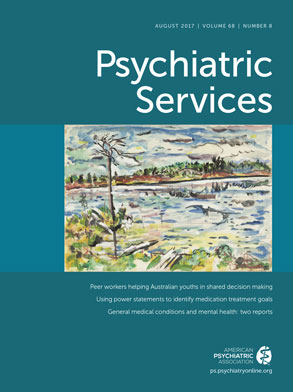TO THE EDITOR: The posttraumatic stress disorder (PTSD) treatment outcome literature for individuals with severe mental illness is growing but remains underdeveloped compared with outcome literature for other traumatized groups (
1–
3). Collectively, these studies suggest that specialized PTSD interventions are effective for this population and result in statistically significant reductions in PTSD severity from baseline to postintervention or between active and control group conditions. Data further suggest that PTSD interventions can be delivered without significant distress to this patient population or without exacerbations in the primary symptoms of severe mental illness. To better understand how individuals with severe mental illness respond to PTSD treatment, we compared the trajectory of PTSD symptom change between a sample of 55 veterans with PTSD and severe mental illness and a sample of 65 veterans with PTSD but without severe mental illness who presented for treatment at a southeastern Veterans Affairs medical center and who were enrolled to receive prolonged exposure therapy for PTSD (
4).
Assessments for the study were conducted between January of 2008 and June of 2014 with full approval from appropriate institutional review boards. Structured diagnostic interviews were used to confirm a diagnosis of PTSD in both groups and to confirm the presence of a diagnosis of severe mental illness in the PTSD–severe mental illness group (including psychotic disorder, bipolar disorder, or severe depression coupled with history of psychiatric hospitalization, medication management, or assistance in daily living). PTSD symptoms were monitored with the PTSD Checklist (PCL) during treatment (
5). A mixed-methods repeated-measures (MMRM) model with unstructured covariance was used for comparing PCL posttreatment means and response profiles for veterans with and without a severe mental illness.
Results revealed that veterans with PTSD and a severe mental illness had higher PCL scores at baseline (mean±SD=66.7±8.9 versus 61.4±12.3, p=.009), were more likely to be female (35%, N=19 of 55, versus 0%, N=0 of 62, p<.001), and were less likely to be veterans of Operation Iraqi Freedom or Operation Enduring Freedom (36%, N=20 of 55, versus 66%, N=43 of 65) compared with veterans with PTSD only. Despite these baseline differences, veterans in the two groups completed a comparable number of treatment sessions (median=8.0, mean±SD=7.5±4.4, versus median=9.5, mean±SD=7.9±3.8, for PTSD/severe mental illness and PTSD-only groups, respectively; p=.687, Wilcoxon rank sum test). Comparisons between veterans with and without a severe mental illness revealed that the two groups had similar PCL response profiles (MMRM: diagnosis group × time interaction, p=.434). Difference in least-squares–adjusted means at posttreatment for the PTSD/severe mental illness group versus the PTSD-only group was not statistically significant, and both groups significantly improved over the course of treatment (from MMRM: main effect of time, p<.001). Coupled with other published data, the study suggested that frontline PTSD interventions can be delivered as developed for persons with and without a severe mental illness with fairly comparable gains. That is, individuals with a severe mental illness do not appear to respond to PTSD interventions in a way dramatically different from their PTSD-only counterparts or in a manner that suggests the need to modify how PTSD interventions such as prolonged exposure are delivered.

